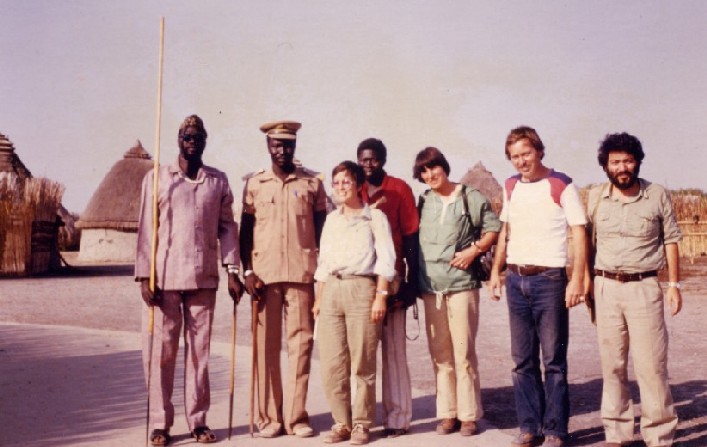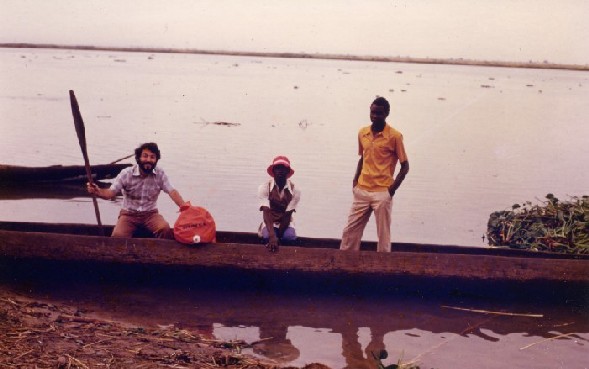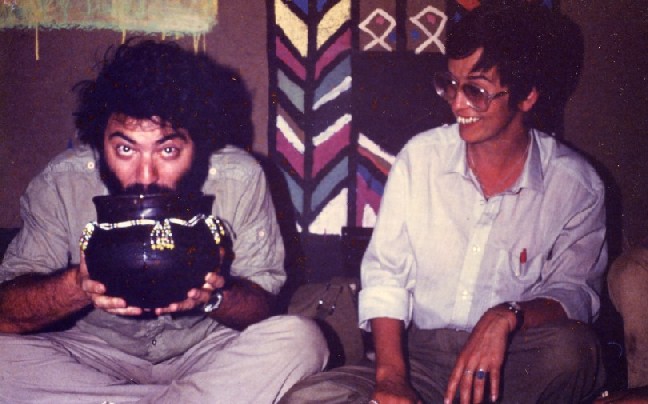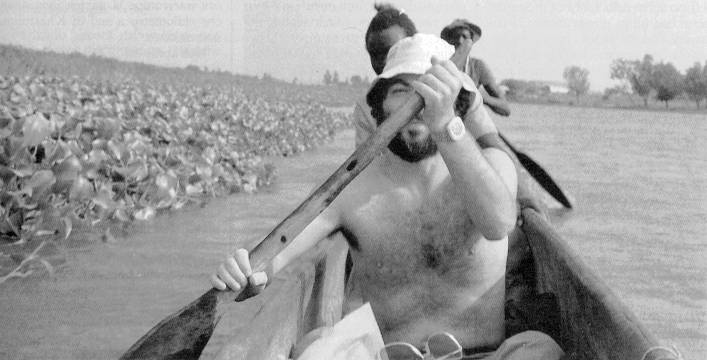
SOUTHERN SUDAN,
A BIBLIOGRAPHY
by FRANCO PELLICCIONI
1966 - 2006
FORTY YEARS OF SCIENTIFIC PUBLICATIONS AND SCIENTIFIC POPULARIZATION
2007 "Dalla "trasmissione orale" alla lettura. Il missionario e antropologo Diedrich Westermann fu uno dei padri della moderna linguistica africana", OR [L'Osservatore Romano], 6 gennaio, 6
2006 "Quell'intrepido toscano tra i cannibali Niam Niam. Un profilo di Carlo Piaggia, esploratore italiano che 150 anni fa visitò gran parte dell'Africa nilotica", OR [L'Osservatore Romano] Domenica, 27 agosto, 6
2004 "Paludi molte, giungle immense, zanzare e malaria a iosa ma gli africani, gli amati dal Comboni, questi amai". Il trentennale soggiorno missionario ha fatto di padre Stefano Santandrea uno dei più grandi esperti del Sudan", L'Osservatore Romano, 14 Febbraio, 3
2003 "Dai Nupe nigeriani ai Nuba del Sudan. I maturi contributi allo studio moderno dell'antropologia dello studioso anglo-austriaco Siegfried Nadel", OR [L'Osservatore Romano] Domenica, 4 maggio 2003, 6
2002 "Di fronte al "Reth" degli Shilluk al confine tra mito e realtà. Un singolare incontro con il sovrano del villaggio di Padwol sulle sponde del Nilo Bianco", L'Osservatore Romano,13 giugno 2002, 3

Before leaving the divine King's village of Padwol a "photographic group...". From left: the 33° Reth (Divine King of the Shilluk) Tipo wad Aney, the Inspector of Sudan Government for the Northern Shilluk Region, my driver Dagi, the German journalists that were with me, I.
2002 "Tra le isole di papiri galleggianti che impedirono a due centurioni di Nerone di raggiungere le sorgenti del fiume. Un avventuroso viaggio in piroga sul Nilo Bianco", L'Osservatore Romano, 13-14 maggio 2002, 3.

Before the Adventure.... A photo on the bank the White Nile at Malakal, on the pirogue, with my two research-assistants. In the water-proof and floating bag I have food, water, maps and the photographic equipment...
2002 "Lo studio sistematico del popolo dei Nuer. Nasceva un secolo fa l'inglese Edward Evans-Pritchard uno dei maestri dell'antropologia sociale", OR [L'Osservatore Romano] Domenica, 28 aprile 2002, 6
2002"Seimila chilometri di giungla portando sulle spalle un battello a vapore smontato. Sulle tracce dell'ottocentesca "Spedizione Marchand" nel Sudan meridionale", L'Osservatore Romano, 8-9 aprile 2002, 9

Also a teetotaller like me cannot refuse to drink the alcoholic merissa offered by an old counsellor to the european guests in one of the royal huts of the Reth of the Shilluks. The wife of one of the german journalists looks amused...
1999 "Giunse il tramonto e mille luci già brillavano dalle numerosissime piccole abitazioni di Malakal…". Un viaggio di studi antropologici nel Sudan meridionale", L'Osservatore Romano, 5 December, 3
1999 "Quei villaggi "incantati" e immutati nel tempo". Da Kosti a Malakal, nel Sudan meridionale, navigando lungo il Nilo Bianco su un vecchio battello a pale", L'Osservatore Romano, 24 November, 3
1999 " La complessa epopea dei "navigatori del Nilo Bianco". Appunti di viaggio di un antropologo in Africa", L'Osservatore Romano, 12 November, 3
1996 "La Darb el-Arba’in: "la "carovaniera sudanese tra mito e realtà" , Nigrizia, in press

Paddling on a Shilluk Pirogue along the White Nile South of Malakal
1996 "Risalendo il Nilo Bianco in piroga. (Dal "diario di campo" di un antropologo)", L’Universo, in press
(This is substantially an "abstract" from the field diary written by the A. during his research in the Southern Sudan's town of Malakal. More exactly the article tries to give the reader the "feeling" and the "taste" of "Routine" and "Adventure" in the course of an interesting aside survey trip made by him with the only way of transportation at his disposal :a well built Shilluk pirogue. On board there were also his two local research assistants. So the party went for one long day upstream, along the waters of the famous White Nile, just looking for any valid pieces of information and historical data connected to the two previous "urban" centres, in existence long before the foundation of Malakal town. And Malakal in 1981 was the chief town of the Southern Province of the White Nile. The article describes to the reader what does it means, to a western scientist, "going to the anthropological field". But the article it is more than that. It is more than a scientific paper: because the river he navigates, the lands he knew and saw, the peoples of the several Nilotic tribes he met there, and elsewhere, in Southern Sudan, are no more reachable from the outside world. This article is moreover one of the last witnesses about a "lost world" that belongs to the deep and distant land of a Thirld World Country. Where, since many and many years, peoples are fighting and struggling hard for their lifes and homes and fields and cattles. And nobody knows about it, or it should be said that mass media, televisions and newspapers, don't give, normally, any news about it. So that land do not exist at all for the world, for us! Because usually nobody speaks about it. That "lost world" gets a new life only in those rare circumstances connected to an emergency aid from the UN. But frankly it is too little! The A. dedicates the document to all the desperate peoples of Southern Sudan, hoping that one day they could again and finally be confident in a peaceful future and in their future).
1995 "Ufficiali governativi coloniali missionari e studiosi nel Sudan meridionale", Rivista Geografica Italiana, Firenze, CII, 4, December, 675-700
(COLONIAL OFFICERS, MISSIONARIES AND SCHOLARS IN THE SOUTHERN SUDAN: The A. in this paper, which is part of a wider working out project concerning the ethno-anthropological data gathered in the area of Malakal (Sudan), gives us a quick survey of the field-researches carried out by colonial officers, missionaries and scholars, since the beginning of the XIX century up to today, in the Southern Sudan, often at the risk of losing their lives. This review includes works in the fields of ethnology, and socio-cultural, urban and phisical anthropology, linguistics and geo-history, and it tries to bring to the reader's knowledge all those researchers, who have contributed, in a valuable way, to the scientific understanding of that extremely variegated world of peoples and cultures. Another sound argument, which reinforces the above-mentioned aim of the A., is singling out in the fact that those lands have been compelled, over a very long period lasted almost two centuries, during which raids, slavery, invasions, wars and guerrilla warfares, have pitilessly hit the socio-economic web of those peoples, sometimes crumbling it)
(OFFICIERS COLONIAUX, MISSIONAIRES ET SAVANTS DANS LE SOUDAN MERIDIONAL: L'A. dans cet article, qui fait partie d'un plan d'élaboration plus étendu des données ethno-anthropologiques rassemblées dans l'agglomeration de Malakal (Soudan), compte offrir un rapid coup d'oeil des recherches sur le terrain. Donc des recherches empiriques, ethno-anthropologiques et de l'anthropologie urbaine, de l'anthropologie physique, de la linguistique et de l'histo-géographie, recherches souvent menées, au péril de leur propre intégrité physique, par les offiers coloniaux, les missionaires et le savants, dès le début du XIX siècle jusqu'à nos jours, dans le Soudan méridional. L'ouvrage essaie de faire connaître au lecteur tous ces chercheurs qui, au cours des années, ont apporté une contribution appréciable à la connaissance scientifique de cet univers extrêmement varié des populations et des cultures. Et ceci est encore plus valable si nous pensons que ces terres on dû supporter une très longue période de deux siècles environ, durant laquelle des razzias, l'esclavage, des envahissements, des guerres et des guérrillas ont cruellement frappé, quelquefois en le désintegrant, le tissu socio-économique et culturel de ces populations)
1993 " Malakal,Nilo Superiore: modelli etnici di urbanizzazione nel Sudan meridionale", Studi Etno-Antropologici e Sociologici, XXI, 19- 30
(MALAKAL, UPPER NILE PROVINCE: ETHNIC URBANIZATION PATTERNS IN SOUTHERN SUDAN)
1992 "L’attuale rete urbana nel Sudan meridionale. Città e zeribe schiaviste, stazioni e forti antischiavisti", Bollettino della Società Geografica Italiana (BSGI), 10-12, 689-720
1991 "La schiavitù e la città del Sudan meridionale.Genesi e sviluppo dell’urbanizzazione nel XIX e nel XX secolo e sue interrelazioni con la storia della tratta", BSGI, XI, VIII, 7-9, 499-523
1989 " In piroga lungo il Nilo Bianco", Rinnovarsi, September, 19-23
1989 " La straordinaria impresa del capitano Marchand", Rinnovarsi, July-August, 16-18
1989 " Alla presenza di un Re divino", Rinnovarsi, June, 20-23
1989 " Malakal:appunti dalla "geografia della fame", Rinnovarsi, April-May, 31-34
1988 " Nella multi-tribale Isiolo la "diversa" realtà scolastica", Rinnovarsi, September-October, 26-29
Review: M.O.Beshir (ed.), The Nile Valley Countries.Continuity and Change (2 voll.), Sudan Studies Association Newsletter,USA, in press
1987 Review: Bona Malwal, The Sudan. A Second Challenge to Nationhood, Africa, XLII, I, 178-179
1987 "Leggendo i temi degli studenti di Malakal", Rinnovarsi, March-April, 26-28![]()
1985 Malakal,Upper Nile Province:Four Models of Urbanization in Southern Sudan , paper read at the IV Annual Congress of the Sudan Studies Association, East Lansing
1983 Malakal, Southern Sudan:"My Life". Geographical Mobility and Pan-Ethnic Integration among Young Students of the Town's High Schools , paper read at the XI International Congress of Anthropological and Ethnological Sciences, Vancouver
1983 " Un re e il suo popolo: intervista al Reth degli Shilluk", Nigrizia, December, 24-26
1982 "Aspettative e realtà tra gli studenti di Malakal, una città sudanese di "frontiera", L’Uomo, VI, 2, 235-255
(In this article are analyzed the outcome of a transcultural survey carried out over a sample of high school's students in the multi-ethnic town of Malakal, in the Upper Nile Province, Southern Sudan. A polyvalent questionnaire has been administered to the students in which it has been shown a scale of behaviours and attitudes more or less explicited by the Shilluks in comparison with the "other" student--fellows belonging to different tribes. Besides, a scale of values has been elaborated according to the social prestige granted by each tribe and regarding an occupational and professional fan. The modernization in progress in this marginal area is emphasized by the percentage of the preferences which have been given to particular professions, whose idea of prestige is acquired through innovating cultural models, which infer, therefore, the achievement of new social statuses. A further interesting point is inherent in the medium-high scores attained along this scale by traditional activities, like pastoralism and farming. It is this a traditional cultural answer confirmed, anyhow, by modernizing motivational supports).
1982 L'urbanizzazione in Africa come nuova realtà culturale: il caso del Sudan , paper read at the Workshop organized at the Exhibition: "Cultura Italiana e Terzo Mondo", Rome
1982 REVIEW: Abdel Ghaffar M.Ahmed e Mustafa Abdel Rahman, Urbanisation and Exploitation:The Role of Small Centres, Africa, March-June, 191-192
1981 Expectations and Realities among the Educated Youth of Malakal, a Fringe Sudanese Town., paper read at the XLI Congress of the Society for Applied Anthropology (SfAA), Edimburgh
(In this paper are analyzed the outcomes of a transcultural survey carried out over a sample of high school students in the multiethnic town of Malakal. A polyvalent questionnaire has been administered to measure student's attitudes towards the town and towards students from other ethnic groups. A scale of values has been elaborated according to the social prestige granted by each tribe in the occupational and professional structure. The results of the survey must be interpreted in terms of formal scholastic education effects and occupational and local government impact: Abstracts, p. 31)
1982 "Una ricerca antropologica in Sudan: Metodologie, tecniche ed alcune considerazioni", Cimento, XXX, 7, 29-32
1981 "Centri urbani del Terzo Mondo: Malakal, città sudanese sul Nilo Bianco", Cimento, XXIX, 3, 32-36
1980 "Appunti per una storia "tribale" della città di Malakal e della regione dell’Upper Nile, Sudan", REAC, VIII, 89-102
(After having outlined the ethnic-cultural situation of the Upper Nile in which it has been recalled, among other things, the recent and interesting hypotesis about a common ethnic identity which would exist between Dinka and Nuer, the A. exposes the historical features concerning the foundation and growth of Malakal, chief town of the Province. Though such historical reconstruction is an integrating part of a more ample and articulate work of urban and applied anthropology, nevertheless it could well form a chapter apart, which doesn't meet necessarily its limits within the urban perimeter, but includes the whole region, too. The events which have been reported, even if apparently fragmentary, have as theme the river Nile and all those who - explorers, ivoy-dealers, slave-traders, colonizers, merchants - in the last 150 years have gone upstream, as well as the riverain groups who populate its banks. It is exaclty the active presence of the Nilotic peoples in the restless history of this region wich succeed in giving a "tribal" feature to the article. They were able to provide a positive "answer", indeed, to the strong, repeated, often violent, culture-clashes coming from the exterior and the north, either arabs - Egyptians, Sudanese, Mahdists -, or Europeans)
(Après avoir esquissé un panorama, même concis, de la situation ethnique-culturelle du Nile Supérieur où, entre autres, on se rappelle à la recente et intéressante hypothèse relative à la commune identité ethnique qui existerait parmi les peuples Dinkas et Nuers, l'A. nous offre les éléments historiques concernants la fondation et le développement de la ville chef-lieu de Malakal. Quoique telle reconstruction historique faisse partie intégrant d'un plus large et articulé travail de anthropologie urbaine et appliquée, néamoins elle peut bien constituer un chapitre indépendent, qui ne trouve pas nécessairement ses limites dans le périmètre urbain, mais comprend la region entière soudanaise du Nile Supérieur. Quand même dans leurs apparent caractère fragmentaire, les événements qui sont mentionnés on comme fil conducteur le fleuve Nil et tous ceux-là qui - explorateurs, chercheurs d'ivoire, esclavagistes, colonisateurs, marchands - pendant les derniers 150 ans l'on remonté, ainsi que le groupes riverains qui peuplent ses bord. C'est exactement la partecipation active des populations nilotiques à la tourmentèe historie de la region qui réussit à donner une connotation "tribale" à l'article. En effet ils ont sû fournir une réponse "positive" aux fortes, nombreuses, soivent violentes, poussés acculturatives provenantes de l'exterieur et du nord, soit arabes - ègyptiennes, soudanaises, mahdistes -, que européennes)
1980 "Introduzione all’urbanizzazione sudanese: il modello demografico di Malakal", BSGI, 10-12, 531-540
(AN INTRODUCTION TO SUDANESE URBANIZATION: THE DEMOGRAPHIC PATTERN OF MALAKAL. The A., who has been carrying out for two seasons a research into urban and applied anthropology in the centre of Malakal, Southern Sudan, at first gives a summary of the birth and development of the Sudanese urban centres. The introduction to urbanization of Sudan is followed by the demographic pattern of Malakal which, though for different reasons is to be based on figures by this time out dated, is nevertheless necessary to understand the reality of a "different" ethnic-urban structure as certainly it is the one of the multitribal town of Malakal).
1975 "Decimo anno di attività della "Oxford Library of African Literature", una stupenda raccolta di canti Dinka", REAC, II, 90-92
http://users.iol.it/f-pelli/f-pelli.southernsudan.html
To go to Franco Pelliccioni Main Page:
Northern Atlantic Maritime Communities Program
|
ALL THE ENGLISH WEB PAGES BY FRANCO PELLICCIONI: ATLANTIC RESEARCHES: //Shetland and Orkney, Scotland, UK // Saint-Pierre, Miquelon (DOM, France), Newfoundland (Canada) // Svalbard, High Arctic, Norway // Faroe Islands, Denmark //Outer Hebrides -Western Isles- Scotland, UK / Iceland // Arctic Research // African Research // Italy & Mexico / THE BIBLIOGRAPHIES: GEOGRAPHIC: Alaska / Canada/ Carnia / Egypt/ Italy / Kenya / Scotland / South Africa /Southern Sudan /Western Africa / THEMATIC:ADVENTOROUS WOMEN: Great travellers, Explorers, Anthropologists, Archaeologists American Indians / Applied Anthropology / Environment /Explorations / Inuit/ Maritime Museums / Multiculturalism / Non EU Immigration and the School /North Pole/ PIRATES AND PRIVATEERS IN NORTHERN ATLANTIC/ Racism /SHIPWRECKS / Slavery in Southern Sudan /Trains / Urban Anthropology / Viking World / Volcanoes/ / Whale Hunting / "West" / General / / Document 1 //Document 2 // Document 3 // Document 4 / |
UPDATED 1, 27, 2006